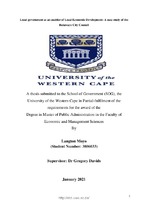Local government as an enabler of local economic development: A case study of the Bulawayo city council
Abstract
Local economic development approaches are increasingly being adopted in Africa to address spatial and territorial inequalities in development. Local economic development prioritises grassroots, bottom-up, regional people-centred approaches, and local partnerships to make communities self-reliant. Amidst this approach, the local government sector is encouraged to facilitate this local development process as outlined as the tier of government that supports participatory democracy. As such, most post-independence African countries embarked on a decentralisation drive to position the local government system to play a key role in local communities' development process. This study focused on understanding the part of the local government sector in enabling local economic development. This dissertation sought to investigate how local governments in Zimbabwe can play a role in supporting the process for achieving a local developmental state. The analysis focuses on the local economic development initiatives implemented by the Bulawayo City Council, with specific attention given to the diversification of their economy through the small and medium business enterprises. The theoretical framework of the study was based on the endogenous development approach. This approach is relevant to local economic development and the role of local government in creating local institutions of the process as it emphasises the local determination of choices, control over the planning process, and the local retention of the benefits within the locale. For the field research, a case study of the Bulawayo City Council was necessary to understand and have insights into economic development, local government structures and process in the Bulawayo Metropolitan Area.

